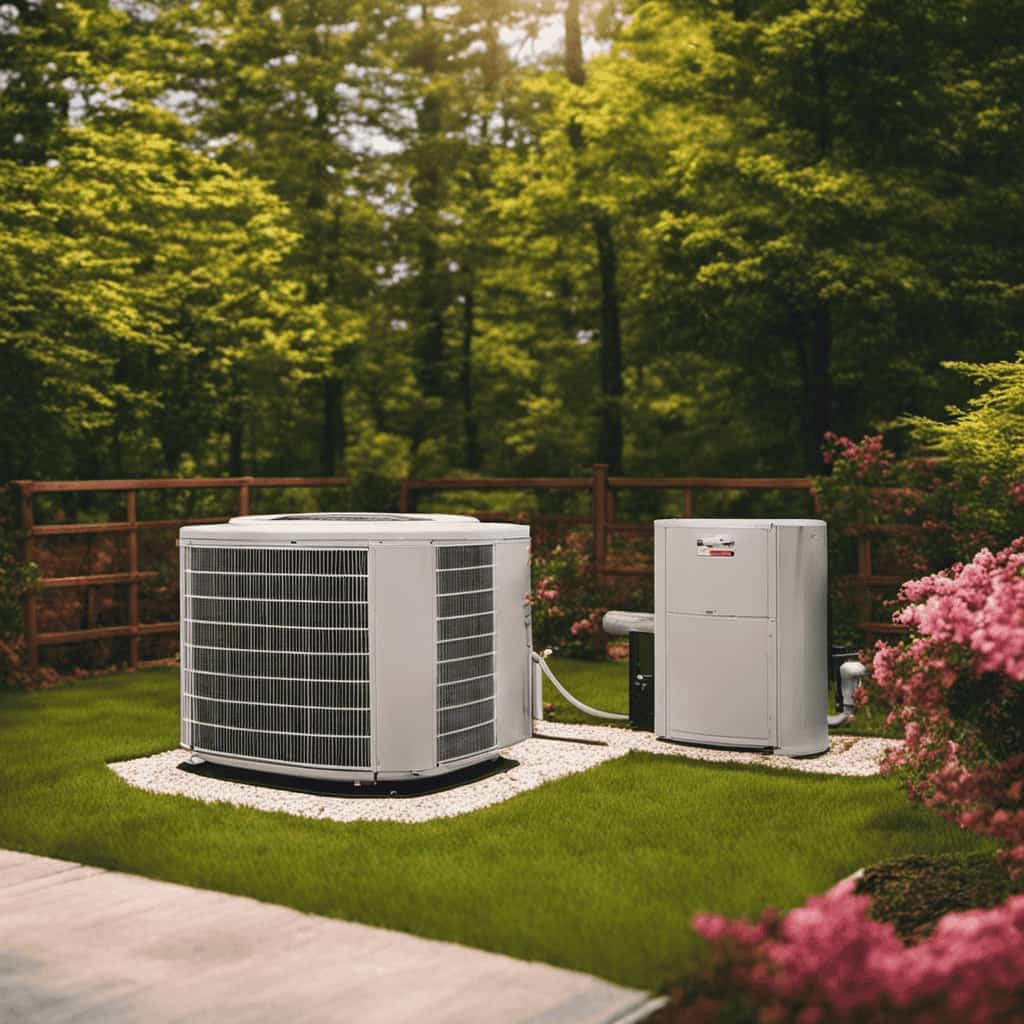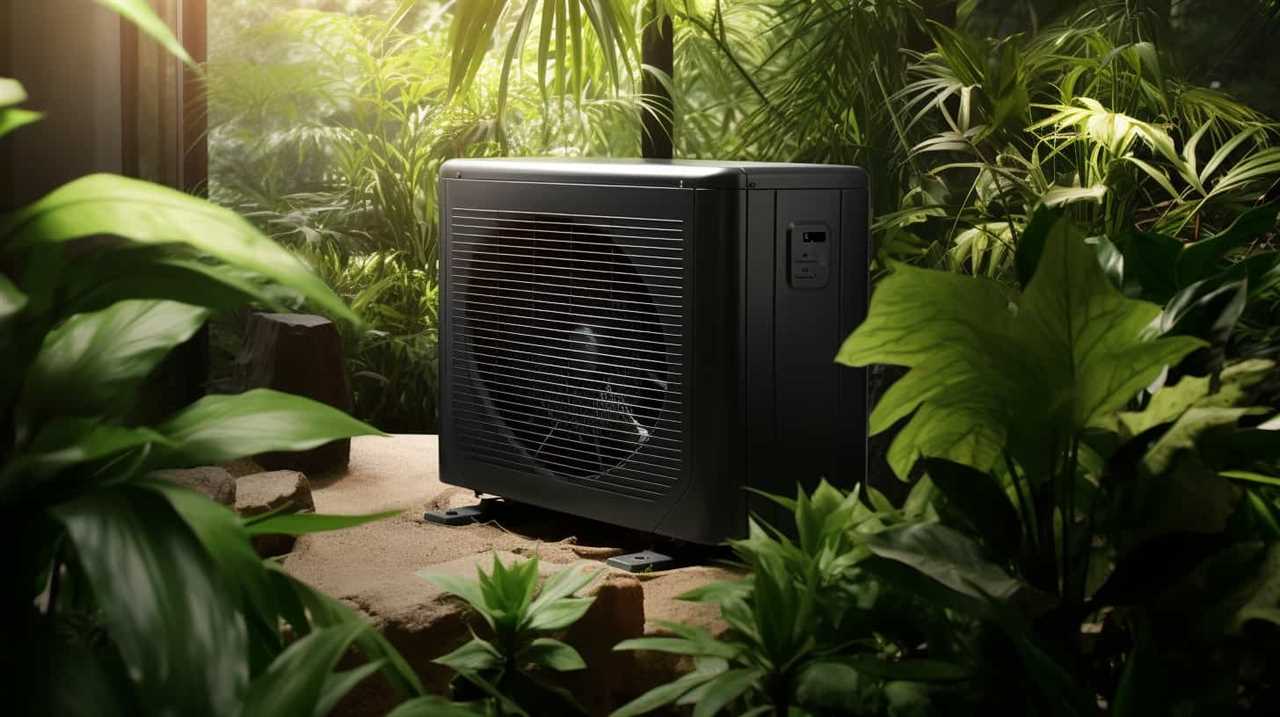Are you tired of paying high electricity bills? We have the perfect solution for you. Learn how you can reduce energy expenses by using efficient heat pumps.
In this article, we will guide you through understanding heat pump efficiency ratings, choosing the right size heat pump for your home, and optimizing performance through regular maintenance.
We will also show you how utilizing smart thermostats and exploring government incentives can maximize your energy savings.
Say goodbye to soaring bills and hello to a more efficient home.

Key Takeaways
- Understanding heat pump efficiency ratings, such as SEER and HSPF, is crucial for reducing energy costs and maximizing savings.
- Choosing the right size heat pump is essential for optimal efficiency and energy savings.
- Regular maintenance is necessary to optimize heat pump performance and energy efficiency.
- Utilizing smart thermostats can help maximize energy savings by programming temperature settings based on occupancy and schedule.
Understanding Heat Pump Efficiency Ratings
Let’s dive into how heat pump efficiency ratings work and what they mean for your energy costs.
With the advancements in heat pump technology, it’s important to understand the efficiency ratings and how they can benefit you. Heat pumps are rated using the Seasonal Energy Efficiency Ratio (SEER) and the Heating Seasonal Performance Factor (HSPF).
The SEER measures the cooling efficiency of the heat pump, while the HSPF measures its heating efficiency. The higher the SEER and HSPF ratings, the more efficient the heat pump is. This means that a higher rated heat pump can provide more cooling or heating for the same amount of energy used.
Choosing the Right Size Heat Pump for Your Home
Our goal is to choose the right size heat pump for our home to maximize efficiency and reduce energy costs. When it comes to heat pump installation, size matters. A unit that’s too small will struggle to heat or cool our home, leading to increased energy consumption and decreased comfort. On the other hand, a unit that’s too large will cycle on and off frequently, resulting in unnecessary wear and tear and higher energy bills.

To determine the right size heat pump for our home, we need to consider factors such as the square footage of our home, insulation levels, and the local climate. Consulting with a professional HVAC technician can help us accurately assess our needs and select the appropriate size.
By choosing the right size heat pump, we can ensure optimal performance and energy efficiency.
Transitioning into the next section about heat pump maintenance, it’s essential to optimize the performance of our heat pump through regular maintenance.
Optimizing Heat Pump Performance Through Regular Maintenance
To ensure optimal heat pump performance, it’s important that we regularly maintain our equipment. By following a heat pump maintenance checklist and troubleshooting common heat pump issues, we can keep our systems running efficiently and avoid costly repairs.

Here are some key maintenance tasks to include in your checklist:
- Clean or replace air filters regularly to improve airflow and prevent dust buildup.
- Inspect outdoor coils and remove any debris or vegetation that may obstruct airflow.
- Check refrigerant levels and ensure they’re within the manufacturer’s recommended range.
- Lubricate motor bearings and other moving parts to reduce friction and extend the life of the equipment.
- Test thermostat settings and calibrate if necessary to ensure accurate temperature control.
If you encounter any of the following common issues, troubleshooting them promptly can help prevent further damage and maintain optimal performance:
- Insufficient heating or cooling: Check air filters, thermostat settings, and refrigerant levels.
- Uneven temperature distribution: Check for blocked vents or duct leaks.
- Unusual noises: Inspect fan blades, motors, and belts for damage or wear.
Regular maintenance and troubleshooting can help us get the most out of our heat pump systems and maximize energy efficiency.
Utilizing Smart Thermostats to Maximize Energy Savings
By programming temperature settings and adjusting them based on occupancy and schedule, we can maximize energy savings with smart thermostats. These thermostats come with energy-saving features and programming flexibility that allow us to optimize the heating and cooling of our homes. With the ability to set different temperature profiles for different times of the day, we can ensure that our HVAC system operates efficiently when needed and conserves energy when not in use.

To give you a better idea, here’s a table showcasing some of the energy-saving features and programming flexibility offered by smart thermostats:
| Energy Saving Features | Programming Flexibility |
|---|---|
| Occupancy detection | Customizable schedules |
| Learning algorithms | Remote access |
| Geofencing | Vacation mode |
| Adaptive recovery | Smart home integration |
With these features and flexibility, smart thermostats empower us to take control of our energy consumption and reduce costs while maintaining a comfortable home environment.
Exploring Government Incentives for Heat Pump Upgrades
We can explore government incentives for heat pump upgrades to help reduce energy costs. Taking advantage of government grants and tax credits can significantly offset the cost of upgrading to a more efficient heat pump system. Here are two key benefits of these incentives:
-
Government grants: Many governments offer grants to encourage homeowners to invest in energy-efficient upgrades. These grants can cover a portion of the cost of purchasing and installing a new heat pump system, making it more affordable for homeowners. Research local government programs to see if you qualify for any grants that can help fund your heat pump upgrade.

-
Tax credits: In addition to grants, governments often provide tax credits as an incentive for homeowners to invest in energy-efficient technologies. These tax credits can help reduce your overall tax liability, making it even more cost-effective to upgrade your heat pump system. Check with your local tax authority or consult a tax professional to understand the tax credits available in your area.
Frequently Asked Questions
What Is the Average Lifespan of a Heat Pump?
The average lifespan of a heat pump is around 15 years. Regular maintenance, such as cleaning filters and checking refrigerant levels, can extend its lifespan. Advantages include energy efficiency and cost savings.
Can I Install a Heat Pump Myself, or Should I Hire a Professional?
When it comes to installing a heat pump, we debated whether to DIY or hire a pro. While DIY can save money, professional installation ensures proper setup and avoids costly mistakes.
Are There Any Disadvantages or Limitations to Using a Heat Pump?
There are a few disadvantages and limitations to using a heat pump. These include higher upfront costs, potential noise, and limited effectiveness in extreme temperatures. However, with proper maintenance and installation, these issues can be mitigated.

How Does a Heat Pump Compare to Other Heating and Cooling Systems in Terms of Energy Efficiency?
Heat pumps are more energy efficient compared to traditional HVAC systems. They can save significant amounts of energy and reduce costs by transferring heat rather than generating it.
Are There Any Safety Concerns or Precautions Associated With Operating a Heat Pump?
Safety concerns and precautions are important when operating a heat pump. It is crucial to regularly inspect and maintain the system to prevent potential hazards. Following manufacturer guidelines and hiring professionals for installation and maintenance can ensure safe operation.
Conclusion
In conclusion, by understanding heat pump efficiency ratings, choosing the right size heat pump for your home, optimizing performance through regular maintenance, utilizing smart thermostats, and exploring government incentives, you can significantly cut energy costs.
Coincidentally, these steps won’t only save you money but also contribute to a more sustainable future by reducing your carbon footprint.

Take action now and start enjoying the benefits of efficient heat pumps for a more energy-efficient and cost-effective home.









